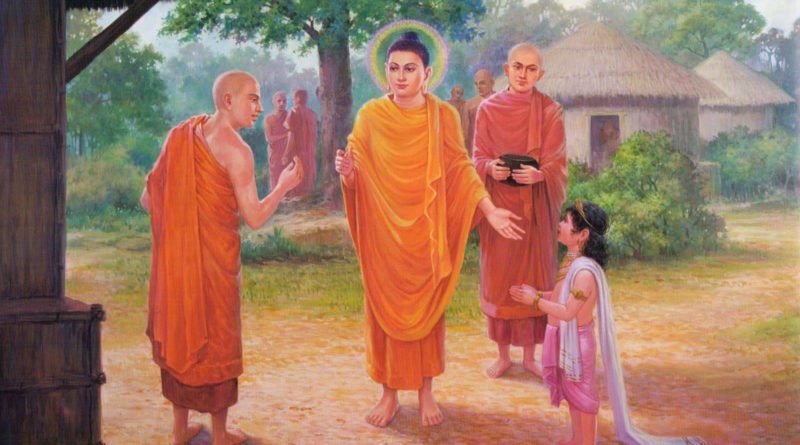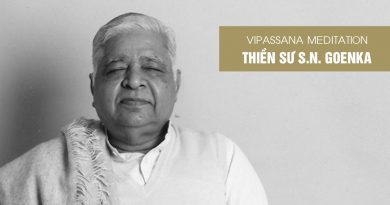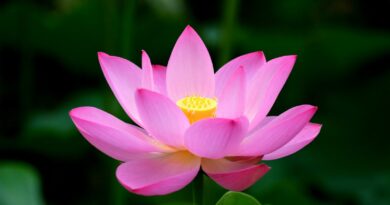The True Ascent And Descent
INCIDENTS FROM THE LIFE OF THE BUDDHA: THE TRUE ASCENT AND DESCENT
A belief prevalent in the society of those times was that in order to get deliverance from the results of evil deeds and defilements one had to undergo physical suffering and bodily pains. It was believed that by undergoing such practices, one can take birth in higher abodes after one’s death.
It was assumed that owing to the results of misdeeds committed in the past we have to face many kinds of physical suffering, and if we have the ability to face such suffering in the present life, why not go through it now. Thinking that they will be released from going through the painful results of the misdeeds committed by them in their past lives and they would take birth in higher abodes after their death if they experienced such afflictions for a long time in this life itself, they kept the body hungry by fasting for long periods and punished the body in several ways.
In the times of the Buddha, people slept on a bed of thorns, fasted for long periods, slept in the open Sun devoid of any shadow in the summer season, and shivered with cold during the winter nights without proper clothing. They did all this so that they do not have to go through these travails in the future.
Apart from punishing the body, many other rites and rituals were also prevalent. Some people believed that worshiping the fire would lead to advancement, and save them from decadence. The fire was worshiped on special occasions to save oneself from falling down in the wrong states. The place was plastered with wet cow dung, green Kusha grass was laid over it, and after taking bath and wearing new silk clothes, they slept through the night on the ground between the fireplace and the house. Three times during the night, they saluted the fire with folded hands and prayed for only advancement and not decline; to only advance to higher states and not go to lower states in future lives. While performing this ritual they poured a lot of ghee, oil, butter, etc. in the fire as libation. At the end of the night, delicious food was served to the Brahmins and they believed that this would lead only to advancement and not to decline in the future.
The Buddha, however, explained that it is impossible to attain freedom from falling down in bad states merely be performing rites and rituals. Therefore, he taught how to practice the pure Dhamma for attainment of higher states – A noble disciple thinks in this way – killing living beings, stealing, speaking lies, engaging in backbiting, talking nonsense, uttering rude and harsh language, having greed and hatred, and performing false rites and rituals, etc. lead only to bad consequences in the present and future life. These misdeeds only spoil one’s future. Thus, he abandons all these misdeeds and lives a life of pure Dhamma and improves both his present and future life. By conducting himself in this way, he only attains higher states and saves himself from falling in the lower states.
======
Similarly, one more ritual was prevalent. Rising early in the morning and touching the Earth while sitting on the cot, touching wet cow dung, touching green grass, tending to the fire, saluting the morning Sun with folded hands, getting down in the water three times a day, etc. A belief was in vogue that the mind gets purified and becomes more refined by performing these acts.
The Buddha explained that as long as a person is engaged in these three impurities committed by the body, he remains far away from the attainment of purity of mind as these are impure physical actions:
If he is engaged in harming living beings, he is cruel with beings, kills beings, is greedy, and blood thirsty. (2) He steals things that belong to others, whether in a village or a forest. (3) He commits sexual misconduct with women; whether belonging to the household of his mother, father, brother, sister, or relative; regardless of whether it is a married woman or a professional dancer.
All these come under physical impurities.
Similarly, there are four impurities of vocal actions:- (1) Speaking lies. When asked to give testimony and told to speak the truth and explain correctly, whether in a meeting, a council, a neighborhood, a village court or a royal court; he says he knows when he does not, he says he doesn’t know when he does; he claims to have seen when he has not, he claims to have not seen when he has. He speaks lies for the sake of an object, belonging to himself or others. (2) Backbiting, (3) Speaking harsh words, and (4) Speaking nonsense.
All these come under vocal impurities.
In the same way, there are three impurities of mental actions:- (1) Being greedy mentally. He wants to obtain wealth and property belonging to others – he plans ways to make it his own. (2) Mentally filled with animosity. He has wicked intentions. He has malicious thoughts about beings – that they be tied and bound, ruined, killed and wiped out. (3) Having false and wrong beliefs. He is unable to comprehend the truth and claims that generosity does not bear any fruits; there is no offering and no oblation, good and bad deeds do not bear any fruits; there exists neither the human world nor the divine world, there exists neither mother nor father; he is unable to believe that he has caused his own birth; there is neither any ascetic nor any Brahmin, neither any right knowledge nor anyone practicing the right path. He projects a false image that he has himself traveled to the divine world and witnessed the truth.
All these come under mental impurities, mental defilements.
In reality, true purity is experienced when a person stays away from unwholesome deeds and embraces wholesome deeds. Then he masters his ability to reach higher states of existence. Such people only rise and improve. There is no falling down or decadence for them.
======
Many types of such blind beliefs were prevalent. Some people thought thus in accordance to my deeds, I will have to live the life of a dog in the future, so why not live the distressed life of a dog now itself. Hence, they adopted the living style of a dog and lived the life of a dog. They accepted only the food thrown on the Earth, stayed naked, sat curled like a dog, slept in the same manner, etc.
In the same way, some thought thus since I have the ability to cope with a distressed life now and in future I have to live as an animal, why not live the life of a cow in this life itself. Let me cope with this in the present itself so that after my death, I am saved from living such a hard life. In this way I will not be required to fall down to the lower existence but only ascend to higher states of living. Thinking thus, they used to live like a cow in their day to day lives. They suffered through various afflictions for this.
How awkward and tactless is this thinking! He does not understand that while he is going through the suffering in the present, he will have to suffer more than this in his future lives.
The Buddha explained while observing the future of such people that such path only leads to lower states of existence. One actually has to take birth as a dog or a cow in future lives and go through more suffering and painful experiences.
If a person of such false belief thinks that by living a life of lower existence filled with suffering in the present, he will attain life in higher divine abodes or to more sublime existence then it is a great mistake. When such people heard and understood the explanation given by the Buddha, they began to lament that their present life up till now has gone waste and in the future also they have to live the lives of lower existence. They requested the Buddha to teach them the right Dhamma. The Buddha then explained –
I have myself known and experienced these four types of deeds:- (1) In this present life, if some action is unwholesome then its consequence is also unwholesome. (2) If some action is wholesome then its consequence is also wholesome. (3) If some action is partly unwholesome and partly wholesome then the consequences are also mixed. (4) If an action cannot be classified as either unwholesome or wholesome, then the consequence can also not be classified as unwholesome or wholesome. This fourth type of action is only helpful in dissipation of the deeds and thereby their consequences.
Which action is unwholesome and bears unwholesome fruits? When somebody inflicts pain on others – through physical action, vocal action or mental action – then after his death, he appears in an existence filled with suffering and he has to experience pain and tormenting touch of red hot iron etc. He has to experience such agonies of hell.
In the same way, when any person does wholesome action through his mind, body or speech, acts to provide happiness to others, remains suffused with thoughts of the welfare of others, makes others happy by uttering soothing words without malice, he experiences peace and happiness in this world and after passing away experiences happy and peaceful sensations devoid of hatred in the higher abodes of existence also.
In the same way, when someone engages himself in mixed actions filled with hatred and devoid of hatred then he experiences both types of sensations in the present life as well as in future lives.
Similarly, a person doing deeds which are neither unwholesome nor wholesome attains freedom from all types of consequences of actions there is no rebirth for him.
The Dhamma teaching expounded by the Buddha helped people to abandon their resolutions based on false beliefs and to walk on the path of Dhamma. They attained the state of total freedom from suffering by practicing the path of Dhamma.
Come, Students! Let us also get rid of false beliefs and false rites and rituals, and live the true Dhamma life and attain happiness and welfare.
Source: VRIDhamma.org





